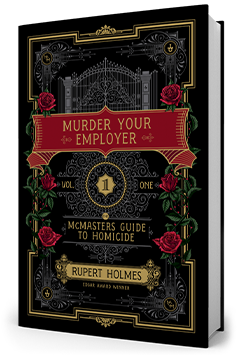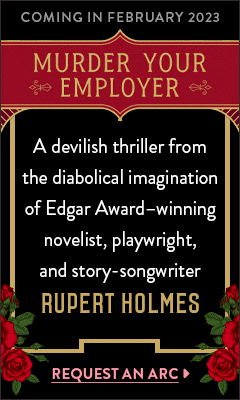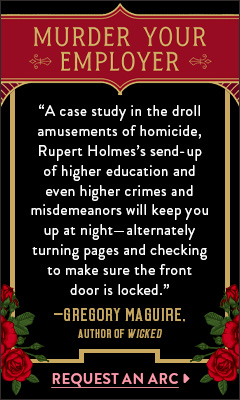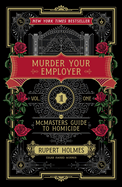Murder Your Employer: The McMasters Guide to Homicide
by Rupert Holmes
"Everyone says 'I could just kill so-and-so,' and yet few do anything about it." Perhaps this is because the average person doesn't know how to pull off a homicide or, more importantly, get away with it. That's where Rupert Holmes's cheeky, pun-tastic novel Murder Your Employer: The McMasters Guide to Homicide comes in:
"So you've decided to commit a murder. Congratulations. Simply by purchasing this volume, you've already taken the all-important first step toward a successful homicide of which you can be proud, one that would gain you the admiration of your peers, were they ever to learn of it.
"This book will see to it that they don't."
The guide, "edited" by Holmes, is authored by Harbinger Harrow, dean of Admissions and Confessions at McMasters Conservatory for the Applied Arts. Set in the 1950s, the stories follow the education of three students--Cliff Iverson, Gemma Lindley and someone registered as Dulcie Mown--who all have something in common: a desire to kill their despicable employers.
Cliff's boss at an aircraft manufacturing company values profit over safety, willing to let a plane be constructed with faulty parts, knowing that it could malfunction and plummet from the sky. Gemma's boss has been blackmailing her, threatening to reveal a secret Gemma fears would destroy her mother. And Dulcie is an actress whose career is being throttled by a lecherous and vindictive studio mogul.
They're all brought to McMasters, location unknown. Students are blindfolded and taken on a circuitous journey to the campus, even if they live nearby. Indeed, the school's very existence is a secret. One cannot apply without a recommendation from someone with a clandestine connection to it. The conservatory accepts students of all ages and requires the applicant's intended "deletion" (murder is deemed too vulgar) to meet the "Four Enquiries": 1) the deletion must be deemed "necessary"; 2) the target must have been given "every last chance to redeem themselves"; 3) not cause any innocent persons to suffer; and 4) the deletion must "improve the life of others."
To mold well-rounded deletists, the school offers classes in such subjects as "Dance Craft" ("ballrooms and nightclubs present many unique opportunities for guile while one's target is distracted or intoxicated"), "Weaponry Around You," on how to use ordinary objects as deadly weapons ("an hour was devoted to the spatula alone"), and "Eroticide," because "romance, desire, seduction, and heartbreak are among the most potent arrows in the McMasters quiver." The curriculum also involves students attempting murder on one another, and they graduate when deemed ready to go back into the world and perform their "thesis" ("this being the term for one's graduation deletion"), for which they will be graded. If they receive a failing grade, the result will be their own deletion.
Holmes has pulled off the feat of creating aspiring murderers who are goodhearted and morally decent. There is no question Cliff, Gemma and Dulcie have no other choice but to rid the world of their targets, to protect not only themselves but many others. Their employers are cruel and greedy and selfish, delighting in the suffering of those with less power. It is because the three protagonists value life that they must each end one. They're not antiheroes so much as altruists with a dark bent.
Fans of Holmes's vast body of work--composer, dramatist, author--will likely not be surprised that a story about murder can also be full of zingers and witty wordplay. After a receptionist keeps Dulcie waiting for a rudely long time in an office and then says, "I'm afraid I was buried in thought," Dulcie retorts, "Yes, and I'm sure it was a shallow grave." When cops show up at Cliff's door, after his unsuccessful attempt at murder pre-McMasters, Cliff observes one is sporting a cheap tie that "looked like an obligatory birthday gift from an unloving wife." And Cliff declares that before contemplating murder, "The only law I'd ever knowingly broken was white wine with steak."
Despite training students in all things death-related, the school has a wondrous campus that rivals Hogwarts. Illustrations and maps created by Anna Luizos help readers visualize a landscape that includes a great hall, a stately manor, a playing field, a ravine and a forest. The cuisine has a three-star (but unpublished) Michelin rating. One can get lost in this immersive world, which begs for a screen adaption.
Humor, lush surroundings and sympathetic characters wouldn't be enough if Murder did not also have clever plotting. Cliff, Gemma and Dulcie must surmount incredible odds to kill their employers, and each devises an intricately complex plan that would challenge even a great detective like the author's namesake, Sherlock Holmes. Even though only two of the leads will succeed, the ending stays true to who they are--people whose heart and humanity can't be extinguished. --Elyse Dinh-McCrillis








_Susan_Woog_Wagner.jpg)